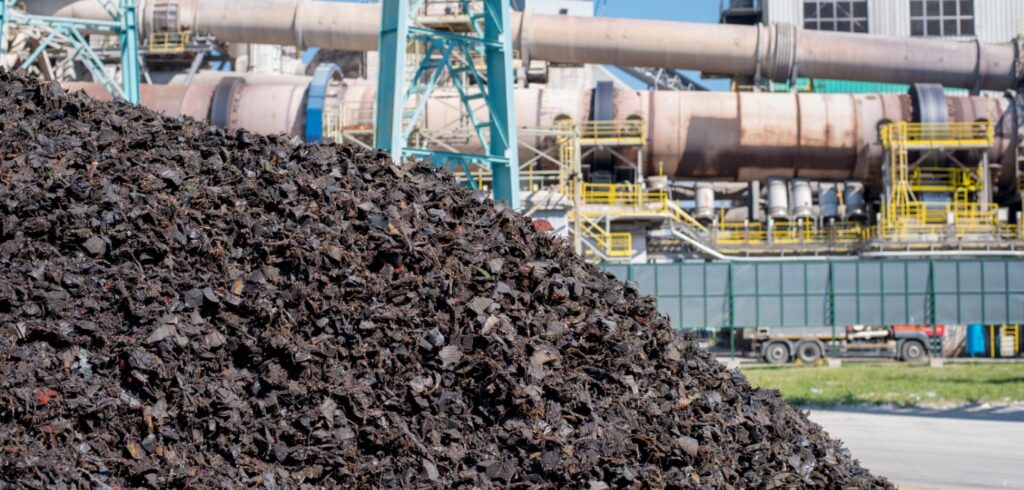Klean Industries has partnered with City Circle Group (CCG) to build a fully integrated, continuous tire pyrolysis plant to recover carbon black and biofuel in Melbourne, Australia.
A project site is already secured and planning permission and permitting are underway. The project is centrally located 45km northwest of Melbourne, Victoria. The project investment is estimated to be US$100m with a construction period of approximately 12 to 18 months. The Melbourne project includes Klean’s commercial scale, environmentally friendly scrap tire carbonization technology with a planned initial capacity of up to 120 metric tons per day (TPD), which is approximately 12,000 tires per day and equates to approximately 40,000 metric tons per annum (TPA). The project is designed to convert the waste tires into highly valuable recovered carbon black (rCB) and recovered fuel oil (rFO). This plant will be fully integrated with Klean’s proprietary tire char upgrading technologies that enable the transformation of low-value tire char into high-value carbon black replacements which can replace Virgin Carbon Black (vCB) by volumes of 10% up to 100% depending on the specific application. Klean has pioneered the commercial scale process for converting end-of-life tires into desirable black carbon alternatives and renewable biofuels, that deliver significant environmental savings.
The manufacturing of new tires uses considerable amounts of petroleum and carbon black from non-renewable resources. Compared to the manufacturing of virgin carbon black, Klean’s CBk KleanCarbon uses 90% less water and emits 90% fewer greenhouse gases than traditional carbon black production and is an environmentally responsible alternative to virgin carbon black derived from end-of-life tires. Klean’s CBk KleanCarbon performs similarly to certain American Society for Testing and Materials (ASTM) reference grades of virgin carbon black but has physical properties and performance characteristics that reportedly improve environmental and function performance while offering cost advantages.
The CCG plant will also include recovered fuel oil upgrading technologies for the conversion of the recovered pyrolysis oil. The pyrolysis oil is condensed and then split into two streams of which approximately 85% is a hydrocarbon product of similar quality to VLSFO 1% and 15% is a naphtha-like product. Additional attributes include notable reductions in carbon emissions as the resulting rFO contains a biobased content of approximately 35-40% which is a result of natural rubber found in end-of-life tires. The CCG facility will be ISO 9001, 14001 certified and all products will also be ISCC certified as circular raw materials.
The resulting products from the Melbourne project will then re-enter the virgin raw material supply chain through the local marine fuel market, new tire, rubber compounding and virgin carbon black manufacturing industries. This enables these industries to create product circularity by re-integrating recovered resources back into the marketplace, enabling these industries to improve environmental performance and lower raw material product costs while also offsetting emissions associated with their respective industries. It’s estimated that the Melbourne facility will offset carbon emissions in excess of 50,000 metric tons annually.
This project will also include the KleanLoop software as a service (Saas) platform which will create a fully transparent end-of-life tire recycling and tire manufacturing marketplace. The CGG plant will be the second tire recycling project to combine all its operation data on the Blockchain and will feature a fully integrated track and trace program for everything it receives and produces that will cross several supply chains. From end-of-life tire collection to recovered carbon black sales to the carbon emission offset produced by the project.
Klean and CCG have been working together in the planning of a project in Melbourne for the past 12 months and have been engaged in the final analysis of a detailed feasibility study (DFS) to design and build a fully integrated tire pyrolysis plant. The result thus far has illustrated a significant opportunity and the parties are now in the final phases of contract negotiations with feedstock providers and offtake parties for all the project output products which are being pre-sold. Both CCG and Klean see the prospects of this project playing a significant role in creating a circular economy within the region as it addresses several key issues designated under the United Nations (UN) sustainable development goals (SDG) and will create economic opportunities and environmental benefits for the local economy in Melbourne. The parties plan to complete the DFS by the end of December 2022 and anticipate the project being financed before April 2023, with construction taking place in 2023 and operations starting in 2024.
Australia currently accumulates over 450,000 metric tons of end-of-life tires annually or the equivalent of approximately 50,000,000 scrap tires per year. According to the partners, that’s enough waste tires to build 8-10 commercial-scale projects across the country. Since introducing its recycling and reuse initiatives, CCG not only dismantles, demolishes and deconstructs buildings but also recycles 100% of all the building materials that result from deconstruction activities. In doing so, CCG converts all the waste into new building materials and commodities for reuse.
Matt Skidmore, CEO of City Circle Group, said, “It is with great excitement that we announce this project and partnership with Klean Industries. Through a long process, we are committed to realizing this facility that we see combines the world’s best practices with local knowledge to solve one of Victoria’s most troublesome waste streams. The concept of waste-to-commodity recycling is something that fits within our vision to become a truly circular economy business that provides real and positive outcomes to our communities.”
Jesse Klinkhamer, CEO of Klean Industries, commented, “We are thrilled to be taking resource recovery to a whole new level in Australia. With CCG as our partner, we are going to define a new era in what it means to develop clean industries. Our industry partnerships speak to our credibility, and it is these relationships that support and enable our team to build world-class facilities that set the global standard in environmental, social and governance (ESG) but will also enhance corporate social responsibility (CSR) to a level not seen before in Australia.”



